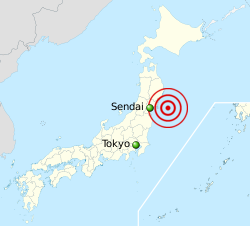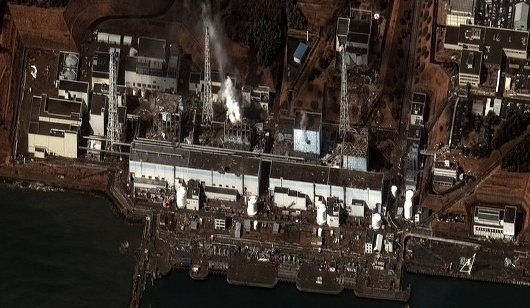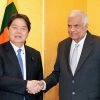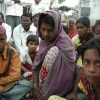Japan Earthquake, Tsunami and Nuclear Crisis
Author and Page information
- This page: https://www.globalissues.org/article/794/japan-earthquake-tsunami-nuclear.
- To print all information (e.g. expanded side notes, shows alternative links), use the print version:
On this page:
Introduction
 The earthquake off the coast of Japan on March 11, 2011 was one of the biggest recorded, measuring 9 on the richter scale.
The earthquake off the coast of Japan on March 11, 2011 was one of the biggest recorded, measuring 9 on the richter scale.
It was the resulting tsunami, however, that caused the most destruction. It devastated the northeast of Japan, leaving many thousands dead or missing, and hundreds of thousands homeless or evacuated from the area.
In addition, various power generators failed. Some older nuclear power stations risked meltdown and suffered explosions and radioactive leaks. Workers have battled for weeks to try and bring the situation under control. Radioactive material has been detected in various places.

It is thought that the cost of the earthquake and tsunami could be over $300 billion — the world’s most expensive natural disaster on record.


There are global economic repercussions as well, given Japan’s key position in the world economy.
More information
There are so many issues that this tragic event has caused that I can’t cover them on my own. However, below are a list of stories from Inter Press Service as they cover this event and its aftermath:
Central Asia–Japan Leaders’ Summit in Tokyo Backs Trans-Caspian Corridor; Tokayev Warns Nuclear Risks Are Rising
- Inter Press Service

TOKYO, Japan, December 22 (IPS) - Leaders of Japan and the five Central Asian states met in Tokyo on Dec. 20 and adopted the “Tokyo Declaration,” launching a new leaders-level format under the “Central Asia plus Japan Dialogue” (CA+JAD). The declaration places at the core of cooperation two priorities: strengthening supply-chain resilience for critical minerals, and supporting the Trans-Caspian Corridor (the Trans-Caspian International Transport Route), which links Central Asia with Europe without transiting Russia.
Japan Backs Africa’s Health Future at TICAD
- Inter Press Service

UNITED NATIONS, September 8 (IPS) - At a time of great transformation for global health, solidarity is more important than ever. As other countries have retreated from their commitments, Japan has instead continued its steadfast investment in a shared future that prioritizes human dignity and security.
Guterres in Japan: ‘Humanity is strongest when we stand as one’
- UN News

World Expos are not just feel-good exhibitions, “they are invitations to tell our stories,” The UN chief told festival goers in Osaka, Japan, which is hosting Expo 2025.
‘Africa is poised for progress’ Guterres tells development conference in Japan
- UN News

The UN Secretary-General on Wednesday repeated his call for Africa to have a greater say in decisions that affect its future, in remarks to a conference in Japan focused on the continent’s development.
Japan’s Right-wing Populist Rise
- Inter Press Service

LONDON, August 4 (IPS) - Rice queues – something once unthinkable – began appearing around May. As the country’s staple food hit record prices, frustrated shoppers found themselves breaking a cultural taboo by switching to rice from South Korea. It was a symbol of how far Japan’s economic certainties had crumbled, creating fertile ground for a political shift.
First Person: Japanese UN volunteer ‘motivated by the passion of others’ to support peace
- UN News

A United Nations volunteer from Japan has said as a teenager he was motivated by the “passion” of young people he met on an exchange programme to contribute to peace and development initiatives.
Victims of Japan's Eugenic Protection Law Sterilized and Mutilated Without Consent
- Inter Press Service

NEW YORK, Jun 13 (IPS) - Victims of Japan's costly Eugenic Protection Law took to the stage sharing their life stories, offering their tragedies of sterilization and mutilation, in return for the hopes of “a society without discrimination”. At a side event on International Sharing of the Experiences and Lessons of Japan's Former Eugenic Protection Law held on June 10th, The Conference of Parties on the Convention of the Rights of People with Disabilities Discussed the struggle for Anti eugenic ideology. Hosted by the Japan Disability Forum along with several legal defence teams for the victims, an outline of ideology, policy, and retribution was displayed, in an attempt to fight against “eugenics-based discrimination”.
Shaping a better world at Expo 2025 in Japan
- UN News

How can we build a fairer, more peaceful world while safeguarding the planet? That’s the powerful question at the heart of the United Nations Pavilion at Expo 2025 in Osaka, Japan.
Japanese Bank Criticized for Financing Mozambique LNG Project Blamed for Displacement
- Inter Press Service

NAIROBI, Dec 23 (IPS) - Climate and environmental activists from Japan have criticized the Japan Bank for International Cooperation (JBIC) for financing the controversial Mozambique Liquefied Natural Gas (LNG) project to the tune of USD 3 billion in a loan signed in July.
Guterres congratulates Japanese anti-nuclear group on Nobel Peace Prize win
- UN News

UN Secretary-General António Guterres congratulated the Japanese anti-nuclear weapons organization Nihon Hidankyo which was awarded the Nobel Peace Prize on Friday.
Empowering Women Could Boost Fertility, & Economic Growth in Japan and Korea
- Inter Press Service

WASHINGTON DC, May 23 (IPS) - Women in Japan and Korea face especially tough challenges juggling career and family. Many young women witness their peers encountering promotion delays after marriage and childbirth, dealing with problems splitting housework responsibilities, and having difficulty finding adequate childcare.
Japan: Safeguarding a mother tongue and mother nature
- UN News

When asked what might be the most beautiful word in Shimamuni, the Indigenous language variety spoken on Okinoerabu Island in Kagoshima prefecture of southwestern Japan, Nami Sao pondered for a moment before replying “mihedirodoo.” Her husband, Tomoyuki Sao, is quick to elaborate that its utterance is always enlivened with a smile and tends to make fellow Shimamuni speakers noticeably more pleased than arigatou, the standard Japanese equivalent for saying thank you.
First Person: Japanese town leads the way to a low waste society
- UN News

When the landfill in Osaki, in the southwest of Japan, reached capacity, an incinerator was the logical next step. Instead, the town decided to get serious about recycling. Ahead of International Zero Waste day, marked on 30 March, Kasumi Fujita, a town councillor committed to Osaki’s low waste policies, tells UN News what inspired her.
Reforms vital to build confidence, Japanese leader tells UN Assembly
- UN News

The Prime Minister of Japan said on Tuesday that he is open to meeting President Kim Jong-Un of the Democratic People’s Republic of Korea (DPRK) at any time and without any conditions “to open up a new era together” between the countries.
Japan: IAEA monitoring treated water release from Fukushima nuclear plant
- UN News

Japan has begun discharging treated radioactive wastewater from the disabled Fukushima Daiichi Nuclear Power Station into the Pacific Ocean, 12 years on from the major meltdown there, the International Atomic Energy Agency (IAEA) confirmed on Thursday.
Sri Lanka-Japan: Return of Old Friends
- Inter Press Service

LONDON, Jun 02 (IPS) - On May 24, Sri Lanka President Ranil Wickremesinghe arrived on a three-day official visit to Japan, his second visit to the country, having attended the State funeral of former prime minister Shinzo Abe last September.
UN expert urges Japan to ‘step up pressure’ on Myanmar junta
- UN News

Japan must assume a greater leadership role to address the deteriorating crisis in Myanmar and “step up pressure on the country’s military junta”, a UN-appointed independent rights expert urged on Friday.
Philippines urged to compensate women survivors of wartime rape by Japanese soldiers
- UN News

The Philippines violated the rights of women victims of sexual slavery by the Japanese military during the Second World War by failing to redress the continuous discrimination and suffering they have endured, a UN women’s rights committee said in a decision published on Wednesday.
UN chief condemns DPR Korea missile launch over Japan as ‘reckless act’
- UN News

The UN Secretary-General on Tuesday strongly condemned the launch of a ballistic missile by the Democratic People’s Republic of Korea (DPRK), more commonly known as North Korea, which reportedly travelled over Japan.
Russia’s invasion of Ukraine ‘tramples on the UN Charter’ says Japanese Prime Minister
- UN News

More than 75 years have passed since the establishment of the United Nations as a guardian of global peace, “we are still witnessing the devastation in Ukraine and around the world”, said Japanese Prime Minister, Kishida Fumio, during his speech to the UN General Assembly.
Attacking a nuclear plant ‘suicidal,’ UN chief tells journalists in Japan
- UN News

UN Secretary-General António Guterres condemned a recent attack on a nuclear power station in southern Ukraine during a meeting in Tokyo on Monday with the Japan National Press Club.
First Person: Telling the tragic story of mercury poisoning in Japan
- UN News

Masami Ogata is a survivor of Minamata Disease, a debilitating illness caused by industrial mercury poisoning, which originated in the Japanese town of the same name in the 1950s. As a UN conference on preventing future poisoning outbreaks gets underway, we hear Mr. Ogata’s story.
‘Save as many lives as possible, and leave no one's health behind’: Japan’s message to the world
- UN News

Announcing the donation of up to 60 million COVID-19 vaccines to the UN-led COVAX facility, Yoshihide Suga, Japan’s Prime Minister, said that his country is determined to lead the global efforts to end the pandemic.
Japan: UN chief praises work of emergency responders in wake of deadly landslide
- UN News
The UN chief on Monday extended his condolences to the families of those who died in a landslide, which struck the Japanese coastal city of Atami in Shizuoka Prefecture, over the weekend.
Japan: UN experts ‘deeply disappointed’ by decision to discharge Fukushima water
- UN News
Three independent UN human rights experts expressed deep regret on Thursday over Japan’s decision to discharge potentially still radioactive Fukushima nuclear plant water into the ocean, warning that it could impact millions across the Pacific region.
UN atomic energy agency to work with Japan on Fukushima water disposal
- UN News
The International Atomic Energy Agency IAEA, said on Tuesday that it will work closely with Japan which is preparing to release a million tonnes of contaminated seawater used to cool the stricken Fukushima nuclear power plant.
Japan Should Lead Charge for Equitable Access to COVID-19 Vaccines
- Inter Press Service

JOHANNESBURG, South Africa, Nov 20 (IPS) - Japan should step up and play a role as a global facilitator for equitable access to COVID-19 vaccines, Dr Daisaku Higashi said at a recent Japan Parliamentarians Federation for Population (JPFP) study meeting.
India and Japan’s MPs Act Quickly to Implement Sexual and Reproductive Health Plans after ICPD25
- Inter Press Service

MBABANE, Jan 10 (IPS) - Parliamentarians from India and Japan have hit the ground running by acting soon after the recent Nairobi Summit on International Conference on Population Development (ICPD25).
Japan’s Gender Gap
- Inter Press Service

CHICAGO, Illinois, Mar 27 (IPS) - KAZUO YAMAGUCHI is the Ralph Lewis Professor of Sociology at the University of Chicago*.
Japan is not making progress in gender equality, at least relative to the rest of the world. Despite the Japanese government's attempts in recent years to pass legislation promoting the economic activity of women, Japan ranked a miserable 110 out of 149 in the World Economic Forum's 2018 Gender Gap Index, which benchmarks countries on their progress toward gender parity across four major areas.
Eight Years on, Fukushima Still Poses Health Risks for Children
- Inter Press Service

NEW YORK, Mar 07 (IPS) - Akio Matsumura* is Founder of the Global Forum of Spiritual and Parliamentary Leaders on Human Survival.
On March 11, we commemorate the 8th anniversary of the Fukushima nuclear disaster. To an outside observer, this anniversary passes as a technical progress report, a look at new robot, or a short story on how lives there are slowly returning to normal.
Author and Page Information
- Created:


